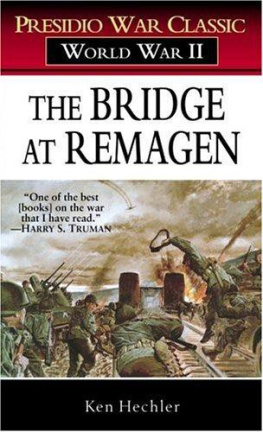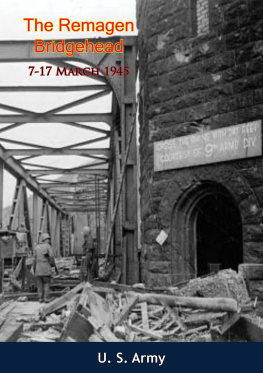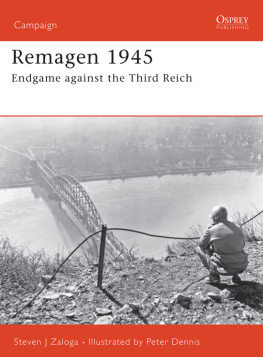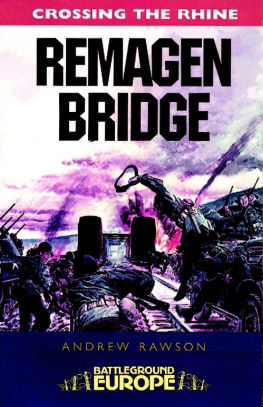Ken Hechler - The Bridge at Remagen: A Story of World War II
Here you can read online Ken Hechler - The Bridge at Remagen: A Story of World War II full text of the book (entire story) in english for free. Download pdf and epub, get meaning, cover and reviews about this ebook. year: 2005, publisher: Presidio Press, genre: History. Description of the work, (preface) as well as reviews are available. Best literature library LitArk.com created for fans of good reading and offers a wide selection of genres:
Romance novel
Science fiction
Adventure
Detective
Science
History
Home and family
Prose
Art
Politics
Computer
Non-fiction
Religion
Business
Children
Humor
Choose a favorite category and find really read worthwhile books. Enjoy immersion in the world of imagination, feel the emotions of the characters or learn something new for yourself, make an fascinating discovery.
- Book:The Bridge at Remagen: A Story of World War II
- Author:
- Publisher:Presidio Press
- Genre:
- Year:2005
- Rating:4 / 5
- Favourites:Add to favourites
- Your mark:
- 80
- 1
- 2
- 3
- 4
- 5
The Bridge at Remagen: A Story of World War II: summary, description and annotation
We offer to read an annotation, description, summary or preface (depends on what the author of the book "The Bridge at Remagen: A Story of World War II" wrote himself). If you haven't found the necessary information about the book — write in the comments, we will try to find it.
The Bridge at Remagen: A Story of World War II — read online for free the complete book (whole text) full work
Below is the text of the book, divided by pages. System saving the place of the last page read, allows you to conveniently read the book "The Bridge at Remagen: A Story of World War II" online for free, without having to search again every time where you left off. Put a bookmark, and you can go to the page where you finished reading at any time.
Font size:
Interval:
Bookmark:

It was inevitable that a book would someday be devoted to this exploit, and it is fortunate that Ken Hechler has written the book. As a United States Army combat historian, he was on the spot. He talked to American participants and after the war he interviewed German survivors. Here is a blow-by-blow account that probably comes as close to the truth as history can hope to approach.
The New York Times
In war, time and timing are of vital importance. Nowhere is this better illustrated than in the epic of Remagen. Ken Hechler has produced an account of deep and lasting human interest, a gripping portrayal of the reactions of seasoned leaders in decisive moments of combat. It is an absorbing story, backed by extensive research, and should prove to be a great contribution of military history.
GENERAL M. B. RIDGWAY (Ret.)
Books published by The Random House Publishing Group are available at quantity discounts on bulk purchases for premium, educational, fund-raising, and special sales use. For details, please call 1-800-733-3000.

Broad success in war is usually foreseen by days or weeks, with the result that when it actually arrives higher commanders and staffs have discounted it and are immersed in plans for the future. This was completely unforeseen. We were across the Rhine, on a permanent bridge; the traditional defensive barrier to the heart of Germany was pierced. The final defeat of the enemy, which we had long calculated would be accomplished in the spring and summer campaign of 1945, was suddenly, now, just around the corner.
General Dwight D. Eisenhower, Crusade in Europe
For me it always typified one thing: the dash of ingenuity, the readiness at the first opportunity that characterizes the American soldier.
President Dwight D. Eisenhower, remarks at tenth anniversary reunion of Remagen heroes, The White House, March 7, 1955
When as Historian of the European Theater in the 1945 summer I began to bring the German commanders and their staffs into our operation so that we might know their side of the World War II combat story, nothing more astonished me than their shock at the blow dealt them at the Remagen bridge.
Their reverses at Avranches, Utah Beach and in the Ardennes they could understand and even accept with no feeling that the results were other than the mathematically inevitable. But toward Remagen they had the demoralized view of men who feel lost because fate has mocked them and black magic fights on the other side. When the first Rhine bridge was lost, the Hitler Army reeled and its combat leaders became gutted of hope. This was the real significance of the Remagen episode, which was not a battle in any real sense but rather a military accident.
Until Remagen occurred there was always another barrier behind which this fraying army could dream of collecting itself and holding until some terms could be made. Thereafter the dream died.
Remagen killed us, the German generals said over and over. How could it have happened? We are a military people. We are not that careless. Their tones reflected that what had shattered hope was also the death stroke to pride. The German soldier is a precise individual. He glories in his ability to engineer all things well in war, to build and plan beyond possible intervention by chance, and to look good even in defeat. Remagen dispelled the legend even for those who are readiest to proclaim it.
In that hour we could not tell them in detail by what weird circumstance their line at the Rhine had become unhinged. The story of human failure and daring, of technical miscalculation and of tactical hazard, which composed the mystery, was of small-bore concern compared to the vast battle operations of the Theater. It was bound to be a wonderful tale replete with the values ever present when in war people stake their lives on their personal decisions. But it had to wait.
We knew that on our side many men, at varying levels, claimed part of the credit for the seizure and exploitation of the Remagen bridgehead. Not all who deserve it will ever be acknowledged their full due. That is true of all operations in war. At first only a few men may see the opportunity, as young Timmermann and the commander, General Hoge, saw theirs, when gazing from the height above Remagen they thrilled to the sight of the Ludendorff Bridge still intact. But unless upward through the chain of command there is an immediate, acute appreciation of the full military significance of what men forward know by sight, there is no payoff. In war it is infinitely difficult to change plans already in motion and give new direction to forces already under momentum.
Still, at Remagen this was done. After the bridge was taken the penny press heaped much cheap scorn on the High Command, trying to make the point that the energy and imagination of a few determined fighters had embarrassed the well-laid plans of its master strategists to their undying chagrin. Nothing of the kind happened. General Bull's words of consternation, quoted in this book, were a first momentary reaction; he thought better of them within a few minutes. General Eisenhower, hearing by telephone of the Remagen wonder almost immediately, responded: Get all the troops across that can be moved. Field Marshal Montgomery, with all his army group already set for a full-scale go at the Rhine, got the news and replied: That is just bully. But the legend dies hard that military brains love to do all things the hard way.
As I have said somewhere in my military writings, no decision in combat is more difficult to make, and to time correctly, than the blowing of a bridge. There is an awful finality about it even when troops are moving offensively and view the bridge both as an avenue to high enterprise and a fire-slot inviting counterattack.
When commanders on the spot stay in doubt about their main decisions, inevitably there can be no unity of resistance by their troops and fire quickly flags to the vanishing point. The clear marks of weapons and tactical near-paralysis among the Germans on both sides of the Rhine at Remagen may be read between the lines of this narrative.
Among United States troops in the attack there were the ever-present few hardy spirits who love to skate on thin ice. When the opening looms and well-organized fire is not directly grouped and going from behind it, the mere smell of a possibly overwhelming danger will not stop them. The risk has to be palpable and thickly present to keep them from boring in. There are adventurous men like Timmermann in every American unit; one mistake made by the German command in World War II was that it too lightly esteemed their energizing influence over all American operations.
I have known Ken Hechler since 1944, when Normandy was invaded. While the fighting lasted he was a combat historian, working always in the fire zone. It was after V-E Day that he drew the heaviest assignment of his life. When I decided that we had to fold the German commanders into our show to complete the history of the Theater my own time was taken up with bulldozing a right of way for this unique program through our own General Staff. Someone else had to do the pioneer work in the field, dealing with the Germans in person to determine the potential for the work while they remained in the POW camps. Out of this research we expected to develop our rules of procedure and the physical setup which the operation would require.
Font size:
Interval:
Bookmark:
Similar books «The Bridge at Remagen: A Story of World War II»
Look at similar books to The Bridge at Remagen: A Story of World War II. We have selected literature similar in name and meaning in the hope of providing readers with more options to find new, interesting, not yet read works.
Discussion, reviews of the book The Bridge at Remagen: A Story of World War II and just readers' own opinions. Leave your comments, write what you think about the work, its meaning or the main characters. Specify what exactly you liked and what you didn't like, and why you think so.











